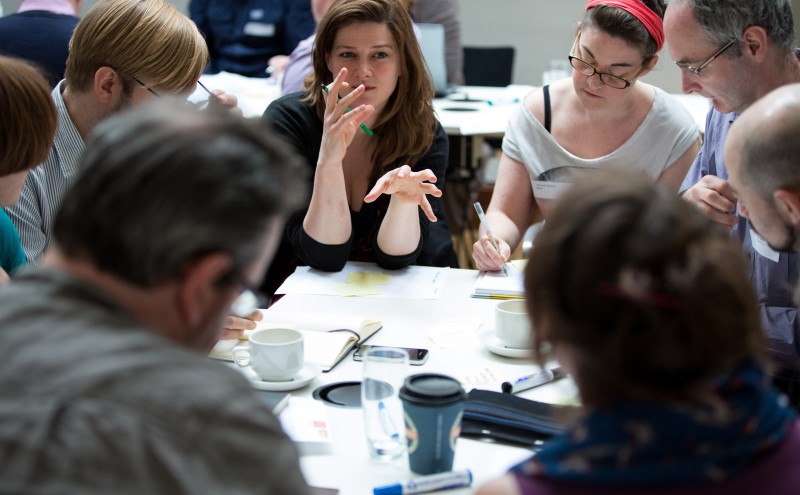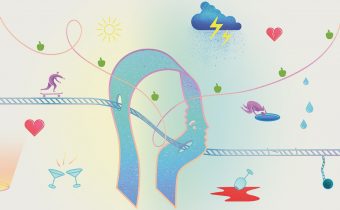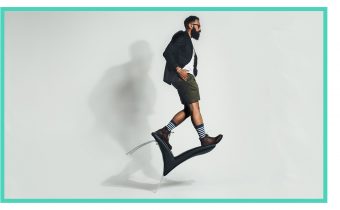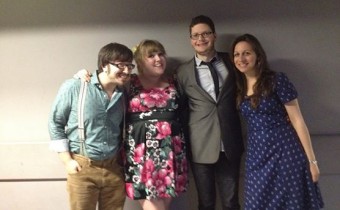Need inspiration? Speak to people who think differently to you
Katherine Bond is the Director of Innovation at the Cultural Institute, King’s College London which is funding and supporting Joining the Dots. She tells the hub how brilliant ideas don’t come out of no-where and why she’s in favour of sharing knowledge.
Director of Innovation – what does that entail? My job is to ensure that the research and thinking within King’s helps to drive innovation across the cultural sector. It is also to ensure that the arts and culture inspire new approaches within King’s to teaching, research and learning.
What are you working on now/this year? We have a portfolio of live projects which speak to four themes: Arts & Digital, Arts in a Global World, Engagement and Diversity, and Curation and Programming for the 21st Century. We have also just launched our second Cultural Challenge, a student competition which challenges students to come up with original ideas for building audiences across four cultural organisations: RSC, V&A, Royal Opera House and Southbank Centre.
“Within times of economic constraint innovative practice becomes more important as
new solutions are required to keep making, creating, developing.”
How do you inspire innovation? We run a programme of knowledge exchange events and ideas labs. These provide a neutral space in which academics, artists and arts professionals can meet, share and develop thinking, collaborate and start to test new ideas.
What part does risk play in creating new thinking? Risk is the potential of losing something of value, weighed against the potential to gain something of value. Risk is an integral part of innovation – we should expect to lose as well as gain – but we need to assess that risk responsibly.
Examples of innovation in music/arts that have impressed you? In terms of leading to a radical shift in how these forms are developed, shared and communicated, itwould be hard not to be impressed by the likes of YouTube and Spotify.
How do you see what a game-changer is before the game has been changed? Can you tell early on? To some extent yes as it is all about vision. If the game-changer clearly communicates their vision and it is a vision that excites and energises people, that is half the journey. I’m guessing Steve Jobs didn’t personally develop the technology for the iPad but had a vision of folk having the internet at their fingertips, wherever they are, whatever they are doing.
How does economic climate inspire impact on innovative practice? Innovative practice needs dedicated time and space. Within times of economic constraint that practice becomes more important as new solutions are required to keep making, creating, developing.
Where do great ideas come from? They do not happen in isolation. They arise from an iterative process involving conversations with many different people from quite different backgrounds, professional settings, and demographics. Allowing the imagination to bounce in different contexts changes and develops thinking.
How do you do that yourself/at work? It is very easy to fall into work silos and it’s comfortable to work with only those we know and trust. I try to break out of that comfort zone by connecting with organisations, groups, individuals who might challenge my own thinking.
When is it okay not to keep doing the same thing? I don’t think it is ever okay. One of the most intelligent things we can do is change our minds.
Why are you supporting Joining the Dots? Because supporting game-changing ideas and connecting people in new ways is exactly what Cultural Institute at King’s is about too. It also allows our academic experts to feed into the process, which means that King’s research is being put to work in new ways.
What are your ambitions for the project (and for yourself?) For the project as a whole, I’d like to see those game-changing ideas, and see them tested and see them realised. Personally, I’m worried that the level of free access to musician’s work means that it becomes the norm for them to work for free, which of course isn’t viable for most people and limits the number of potentially brilliant musicians who go down the composing/performing route. So I’d like to see a more robust system created, perhaps a crowd-sourcing system, for those musicians who have something special, to earn a direct income for their work as it develops.
* Image of a Cultural Institute Arts and Digital Ideas Lab – courtesy of Tim Mitchell.




